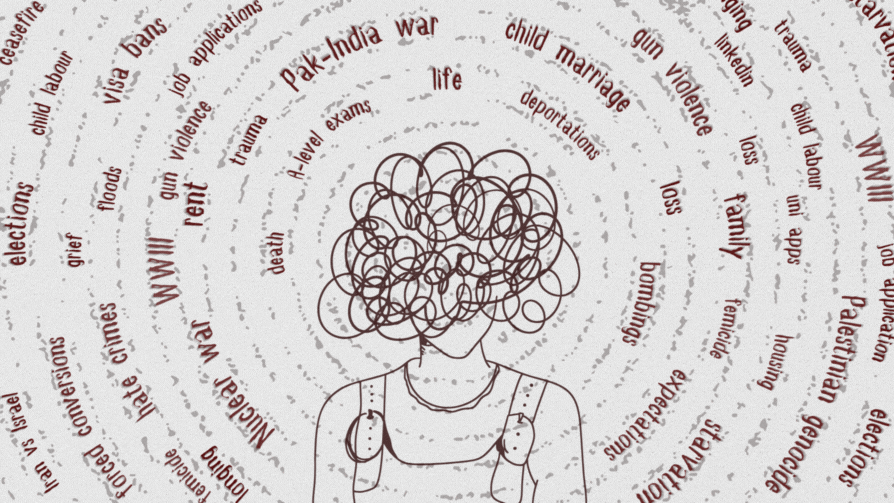How do you make good dramas without good scripts? The answer — you can’t
Pakistan’s TV industry may have come a long way in terms of production value but scriptwriting, a major aspect that makes or breaks a drama, has only suffered with time. Unfortunately, quality storytelling and target rating points (TRPs) have become so intertwined that this toxic mix is causing creative artists to put up with the commercialised demands of show business to sustain their careers with exceptions to this rule being few and far in between.
Regardless of how stellar a drama is in terms of its production, a script is the heart of a good show. With only a few exceptions such as Kabli Pulao, Parizaad, Dobara, Baby Baji, Jindo and Alif, a majority of Pakistani dramas that have concluded in recent years or are currently on-air fall short of portraying important stories to the average Pakistani household. This shortcoming can be attributed to commercialisation, where Pakistani TV channels prioritise competition and TRPs over quality of stories, as well as a lobby of scriptwriters who overshadow lesser known faces in the industry.
Suraj Baba, a 44-year-old drama writer from Narowal, told Images that scriptwriters are forced to regurgitate the same old content for television because of ratings. Pakistani channels are more focused on TRPs than quality of the content they are producing, which defeats the purpose of storytelling as a whole. Creativity is, as we all know, bound to suffer when art in any shape or form is commercialised.
“Initially, dramas were made for the audience. Now they are made for TRPs,” Baba said.
The writer added that many well-written Pakistani dramas were unsuccessful because they failed to attract strong viewership. However, dramas with weaker but far more commercialised scripts emerged as hits. In Baba’s view, channels, marketing teams and the public are to be blamed for monotonous television content we are seeing today.

“Nobody wants change,” he added. “It is supply and demand, you know. If everyone wants to consume daal chawal, how can we, as writers, offer the audience a new dish?” he asked.
Baba acknowledges that a lobby system for drama writers exists in Pakistan’s entertainment industry, just like a lobby system is in place for Pakistani actors. He also emphasised that writers are not revered enough and given sufficient media coverage, especially compared to actors who receive the most limelight.
Despite the Federation of Western India Cine Employees (FWICE) barring Pakistani artists from working in India, Baba latched on to an opportunity to work freely and creatively in the neighbouring country. Last year, he wrote an Indian drama titled Wangaan that aired on PTC Punjabi with reruns airing this year. As Baba advances in his line of work, he hopes for equal opportunity, representation and respect for scriptwriters in Pakistan’s show business.
Faseeh Bari Khan, another Pakistani writer who penned Ghisi Piti Mohabbat and wrote the screenplay for 7 Din Mohabbat In starring Mahira Khan and Sheheryar Munawar, currently runs a YouTube production channel called Kabaarr Khana. Khan created this channel to produce creative content that television channels wouldn’t air. As a scriptwriter, however, Khan did not experience many struggles.
“I never wanted fame or money from writing. All I wanted was to bring stories that were inside me to the audience,” Khan said.

There were occasional disagreements with channel staff about content but none serious enough to bring Khan’s morale down as a writer. He shared that one of his script ideas for Ghisi Piti Mohabbat centred on a body disorder, but the channel officials disagreed with it. Khan stood his ground and defended his written work with logic — something that he feels is very important for scriptwriters to practice.
Khan also recalled an experience where his progressive drama script that portrayed an unforgiving woman was altered by director Amin Iqbal to victimise the female character instead.
“I was upset because the whole point of writing the script was to show an unforgiving woman but the director changed this progressive story by showing yet another compromise on a woman’s part,” the writer explained.
Unlike Suraj Baba, Khan neither knows of a lobby system for scriptwriters nor does he wish to associate himself with one. Regarding new TV channels changing the current and future trajectory of Pakistani dramas, Khan believes they cannot make much of a difference. Although Green Entertainment produces fresher content, it is now blindly following commercialised standards of other TV channels, due to a decline in ratings.
“Our viewers enjoy watching predictable stories on-screen because they have become so accustomed [to it],” Khan shrugged.
Although Pakistan’s TV drama industry is faring well commercially with television marketing revenue amassing $400 million this year, the drama industry will have a hard time maintaining a strong identity if content looks and sounds the same.
Jahanzeb Qamar, senior scriptwriter who has been working with private Pakistani channels for more than 14 years, is optimistic about the country’s small screen industry, claiming that it is churning out content that could not have been aired on TV screens before.

“During the PTV era, written content was censored, but now artists are offered the opportunity to experiment and work with more creative freedom. Things have become easier,” Qamar said.
He added that TV producers are now capable of producing unique content as opposed to a few years ago when production was more linear. Despite his optimism, Qamar said scriptwriters should be self-aware in factoring in the demands and restrictions of TV channels before beginning their writing process. He added that screenwriters may feel forced to write stories a certain way and mould them a certain way. Although Qamar has not experienced this firsthand, he acknowledges that many of his counterparts have been pressured.
Qamar too rejected the notion of a lobby system preventing novices and lesser known scriptwriters from achieving equal success. A lobby system, according to him, exists in major cities like Karachi where television productions predominately take place. The writer currently resides in Sargodha where a lobby system is incapable of operating. Qamar may be right, but if scriptwriters continue to work for TV channels that favour them over others, they have already become part of a deeply flawed, unfair system, and that has nothing to do with where an individual physically resides.
“Scriptwriters are indispensable to TV channels as long as their content sells and is appreciated by the public,” Qamar said. According to him, successful drama writers earned a place in the industry because their work resonated with the public.
Although what Qamar shared is rooted in fact, it is not just the public that makes a successful writer. TV channels play an equally important role in giving writers a platform to thrive, even if their ideas are lousy. However, these TV channels can be biased in their approach and choose to work with a select group of drama writers, which takes away work opportunities from other creative individuals in the field. Lesser known screenwriters with great ideas for television plays can never parallel well-established writers such as Zafar Mairaj, Bee Gul and Umera Ahmed, especially if they are competing for success.
Renowned writers will always take the prize when pitted against newcomers in the TV industry. That is just how show business works, at least in Pakistan.
The responsibility of producing culturally sound content rests with TV channel officials, not scriptwriters. People who hold the highest position in the entertainment business are producers and channel heads who can make amends if they are willing to look beyond monetary gains. However, change will not come if they are hell-bent on earning profits and chasing TRPs. It is equally essential for scriptwriters to form a union that protects their rights as creative individuals and helps them resist profit-driven policies.














Comments